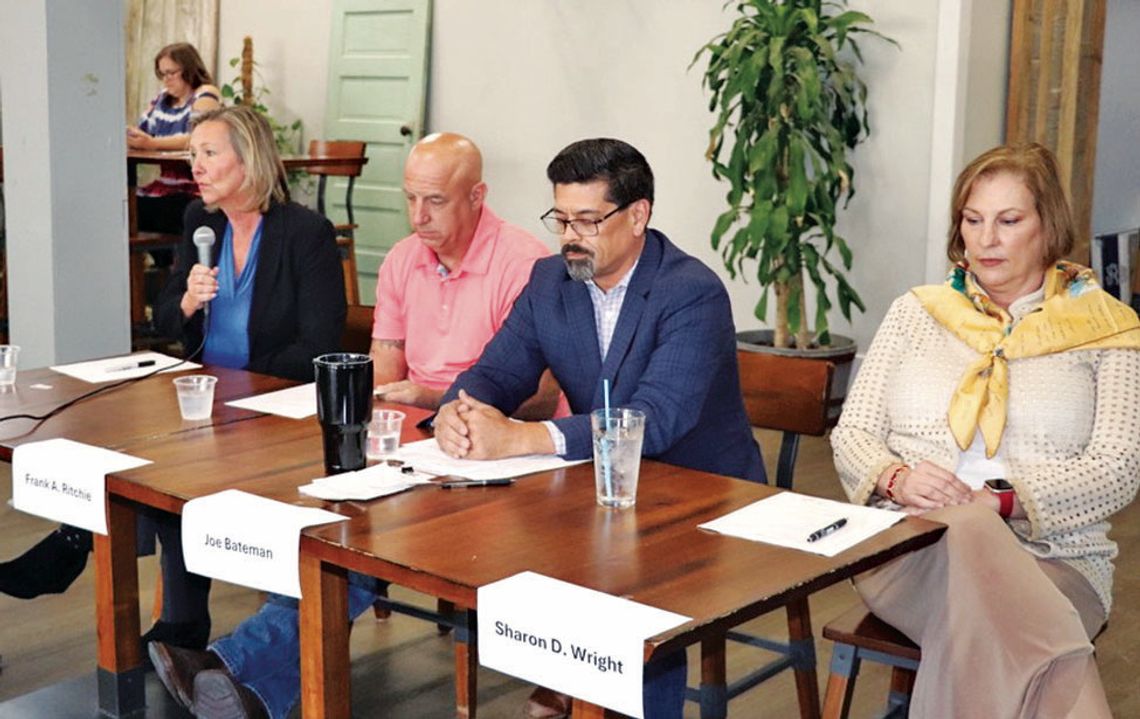Mayor, council candidates field questions from Tea Party
Boerne candidates for mayor and a lone city council seat shared ideas and opinions on everything from traffic congestion and length of council terms, to moving municipal elections to November, during a candidate forum last week.
Members of the Kendall County Tea Party and interested residents filed into Tusculum Brewing Company April 1, where Boerne mayoral candidates Frank Ritchie and Laura Haning and Boerne City Council District 2 candidates Sharon Wright and Joe Bateman waited for their opportunity to address a lineup of questions posed by the invitees.
City Council District 4 Councilman Bret Bunker is running unopposed.
Ritchie and Wright are incumbents, both elected to their first terms in May 2023. Haning spent more than 18 years as planning and community development director and senior planner for the city.
Bateman, who lost to Wright by 21 votes in the 2023 election, is a business development leader and former 22-year regional director with AT&T.
Ritchie opened a line of questioning addressing a topic every Boerne resident is familiar with: the always-congested Herff and Esser roads intersection.
“Herff Road is a road that belongs to us ... but not (State) Highway 46,” Ritchie said, explaining the city’s negotiations with the Texas Department of Transportation, TxDOT, which oversees the state’s highway systems.
“We all know that is ... a source of a lot of anger for our citizens in our community,” Ritchie said. “We don’t need another study; what we need to do is work with TxDOT and the county, which we have already worked with.
“We’re grateful for their support moving forward with one of the three proposals that we have sent to them. We don’t have control over that road,” he said, “But I think we're heading in that direction.”
Haning agreed with Ritchie on working with TxDOT, but said the city’s thoroughfare plan should be leaned on in coming years, so the city does not experience more Herff-Esser traffic nightmares as the city grows.
“What can we do in the future? It’s a TxDOT road, which kind of ties our hands in a lot of ways; there’s only so much we could do,’ Haning said.
“We have a thoroughfare plan in place. The reason for the thoroughfare plan is to plan for the future and as development comes in,” she said, adding, “It forces the developer to pay for those connections, the roads that we need, but it takes time to put it all together.”
One ballot issue voters will see May 3 is an effort to extend city council and mayoral terms from two years to three — a proposal that was voted down last time it made its way onto a ballot.
“We’re talking about 24 months vs. 36 months, a 12-month difference,” District 2 hopeful Bateman said. “There’s a lot of effort that goes into running every other year; the cost to the candidates, the cost to the city.
“I’m not looking at just this next 2 to 3 years. I think if you have somebody that has the opportunity to serve 36 months, it gives them a little bit better position,” he said.
Wright agreed, giving her take on being elected to a first term in 2023.
“It takes a lot to really get your feet wet when you get into office,” she said. “They actually do give you this huge binder. It’s a lot of reading material, and they send you to a two-day course and then you’re expected to hit the ground running.
“It’s a lot to learn. By the time you get comfortable with issues, and standing your own ground with voting, it’s time to run again,” she said.
“You also have to look at what are best practices that other communities are utilizing and according to the comparisons, ours are very short, so I support it,’ she said.
Haning said she could see both sides of the argument, but said she’d rather stick with the twoyear term.
“Anybody that runs for office should, in advance, educate themselves on what the issues are so when they come in, they hit the ground running,” Haning said. “It is a lot to learn ... but when you get into office, you should somewhat know what you’re doing, and certainly know what you’re standing for.”
She said a two-year term is preferable when an elected individual falls short of his or her elected duty.
“If you go to a three-year term and you’ve got somebody in there that is not representing you as you had intended, that’s 12 more months of fighting those battles,” she said, “so I think two years is appropriate.”
Ritchie disagreed, telling the crowd he brought the issue before council and the charter review committee in the first place.
“This is on the ballot because I brought it forth to the council,” Ritchie said.
“When it comes to this election idea, of every two years asking a public servant to put themselves out there again and again; you’re asking a public servant to spend a lot of their own money to try to win an election for a job that does not really pay a lot of money,” Ritchie said.
He also said it takes several months to get acclimated to council procedure and protocol and, about the time council members begin to grasp it, “it’s time for them to start campaigning for office again,” he added.







Comment
Comments